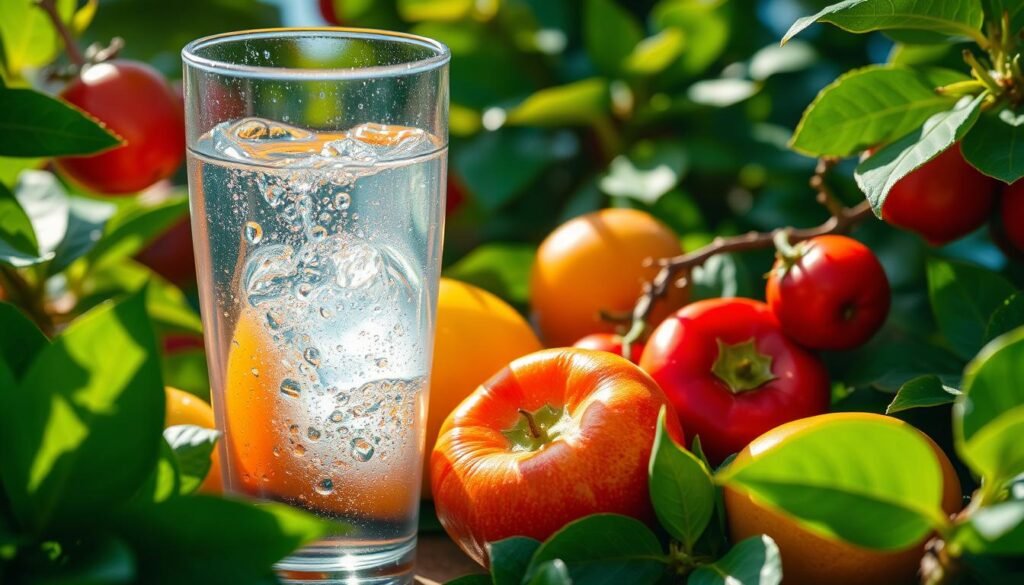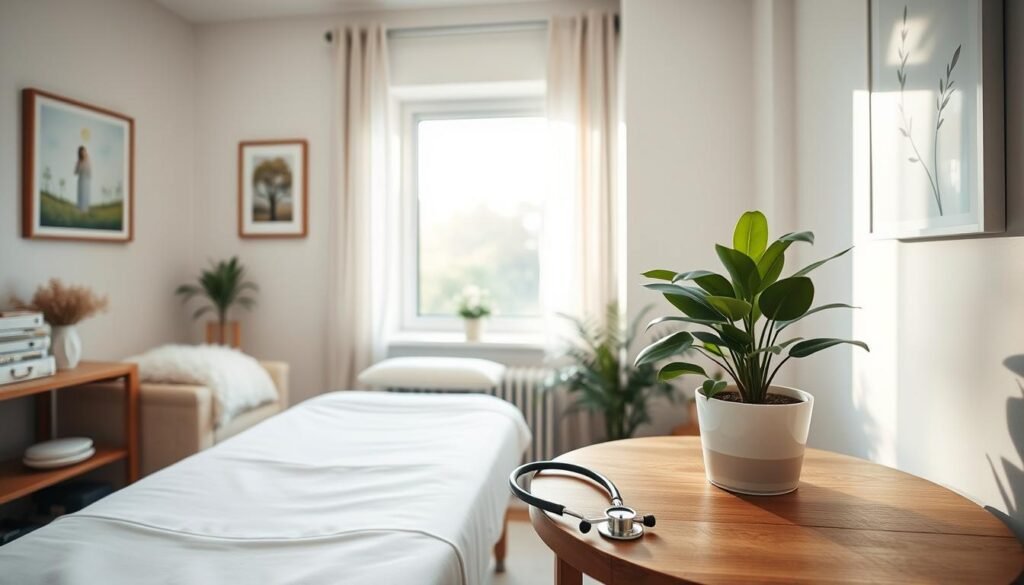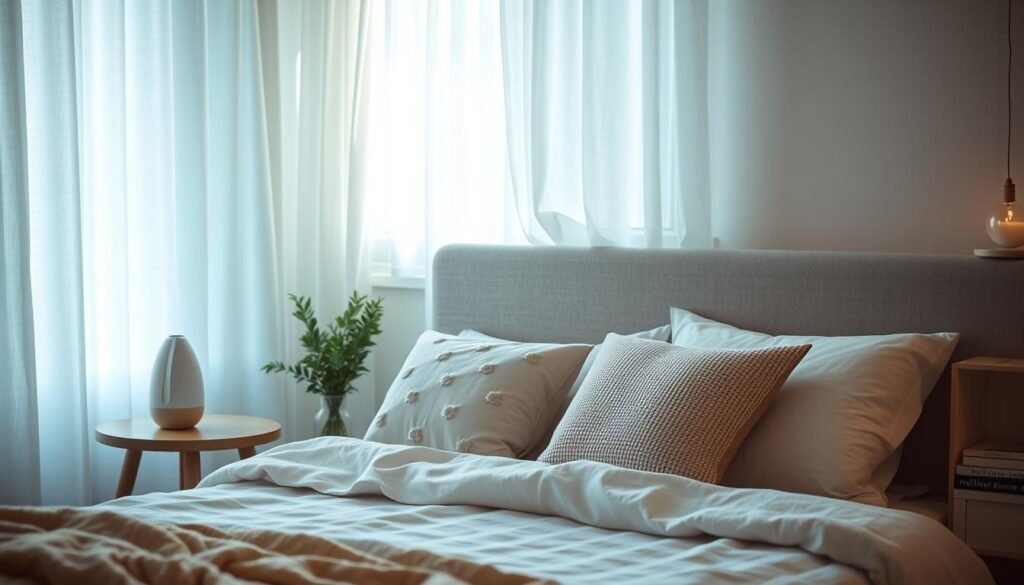Nearly half of older women say they feel tired in ways that affect their daily activities. This fact shows how important it is to know and deal with fatigue as women get older. Fatigue can do more than make you feel out of energy. It can greatly impact your life quality, causing frustration and a sense of helplessness.
This guide aims to offer tips to fight off tiredness and improve energy. By changing your diet, lifestyle, and adding some exercise, you can feel better and more lively. It’s about finding the right balance to boost your well-being in your later years.
Key Takeaways
- Fatigue affects nearly 50% of older women, influencing their daily lives.
- Diet and lifestyle changes can play a significant role in managing fatigue.
- Engaging in regular physical activity can enhance energy levels.
- Hydration is vital in combating fatigue and improving concentration.
- Emotional factors such as stress can contribute to low energy levels.
- Seeking professional help can support better management of fatigue.
Understanding Age-related Fatigue
Age brings a type of tiredness known as age-related fatigue. It’s not just from being active. It happens as energy in older women drops due to changes in their bodies. Hormones, metabolism, and less muscle mass all play a part in this energy dip.
Health problems can also make fatigue worse. Conditions like anemia or chronic pain add to tiredness. Mental and emotional health issues, like feeling stressed or depressed, also affect how tired we feel. It’s important not to ignore how we’re feeling inside when dealing with fatigue causes.
How we live our lives impacts tiredness, too. Not sleeping enough, too much caffeine or alcohol, and late naps can mess up our sleep at night. Also, health issues like not drinking enough water or getting infections can make us feel suddenly very tired. These things can make it hard to get through the day.
Feeling tired more as we get older is expected, but if it doesn’t go away, we need to look into it. Figuring out the reasons behind age-related fatigue can help make life better.
Identifying Symptoms of Fatigue in Elderly Females
It’s important to spot fatigue signs in older women. They may indicate serious health problems. Fatigue in elderly females can show up in many ways. This makes it tricky to identify. A large study found that 40%–74% of U.S. seniors feel tired often. This shows many older people deal with fatigue.
Common indicators include:
- Prolonged exhaustion — A lot of elderly folks feel really tired and rest doesn’t help much.
- Lack of motivation — Doing daily tasks can seem very hard. This may lead to not wanting to socialize.
- Cognitive impairments — Being forgetful and having trouble focusing can point to serious conditions like chronic fatigue or brain health issues.
Fatigue often hints at getting older. It can show someone is becoming weaker. Interestingly, 77% of people over 70 felt fatigued when they went to the hospital. This points to a big need for paying attention and helping out.
Things that make older women feel tired include chronic fatigue syndrome, stress, and health issues like anemia or thyroid problems. Understanding these fatigue signs early is key. Then, we can make care plans that really fit what someone needs. Families and those who care for older women can do a lot. They can help manage fatigue, making life better and healthier.
Managing Fatigue in Older Women Through Diet
Combating fatigue in older women involves more than lifestyle changes. It also involves what they eat every day. Eating right is key to keeping energy levels up. A balanced diet helps in staying lively and cutting down on tiredness.
Importance of a Balanced Diet
Eating a variety of fresh and whole foods is vital. Johns Hopkins geriatrician Alicia Arbaje, M.D., M.P.H., highlights the importance of getting vitamins, minerals, and antioxidants from what we eat. Vitamins like D and B12 are especially good for boosting energy and mood. It’s important not to overdo it on foods that take longer to digest, like red meat.
Foods to Boost Energy Levels for Seniors
Some foods are especially good for older women’s energy levels:
- Legumes: Beans, lentils, and chickpeas are packed with protein and carbs.
- Whole grains: Foods like oatmeal and brown rice give lasting energy.
- Nuts and seeds: Almonds and chia seeds are full of healthy fats.
- Fruits and vegetables: They’re rich in vitamins and antioxidants.
- Fortified nondairy milks: These are a great source of vitamin B12 for those avoiding animal products.
For the best health, older women should cut down on caffeine and sweets. Too much of these can cause energy levels to spike and fall quickly. By eating a balanced diet, managing fatigue becomes simpler, leading to better health.
Coping with Exhaustion: Lifestyle Changes
The journey through menopause often brings fatigue, especially for women. Making lifestyle changes is key to managing this exhaustion. Having a structured daily routine is crucial. It brings stability and helps cope with exhaustion.
Structured Daily Routines
A structured daily routine has many benefits. It sets specific times for tasks, reducing stress and keeping energy steady. Experts suggest regular meals, short walks, and consistent sleep times. Here are more ways to structure your day:
- Prioritize Adequate Sleep: Aim for 7-9 hours of good sleep to refresh your body.
- Plan Meals Wisely: Choose balanced meals to boost energy and overall health.
- Break Tasks into Smaller Steps: Manage your workload by splitting big tasks into smaller parts.
Adding these practices to your daily life can lower exhaustion. Techniques that relax you also promote wellness and energy balance. For more tips on dealing with fatigue, check out this resource.
Importance of Relaxation Techniques
Relaxation techniques are vital for seniors fighting fatigue. They help clear your mind. Meditation and yoga are great for easing tension and improving well-being. Adding them to your routine is beneficial:
- Short Meditation Sessions: A few minutes of meditation can reset your mind and boost energy.
- Gentle Yoga: Yoga makes you more flexible and less stiff.
- Deep Breathing Exercises: This practice can lower stress and improve your mood.
These relaxation methods can make you feel better, both mentally and physically. They help seniors manage daily fatigue challenges. Incorporating these lifestyle changes can ease the menopause journey, boosting energy and comfort.
Boosting Vitality for Older Adults with Exercise
Regular physical activity is key for older adults to boost their energy and well-being. By engaging in structured exercise, they can enjoy many benefits. This includes better moods and improved sleep. It’s important for older adults to find the right exercises to keep their vitality up.
Types of Suitable Exercises
There are several effective exercises for seniors to boost vitality:
- Walking: An easy and effective way to stay active every day.
- Swimming: It’s easy on the joints and strengthens muscles, improving endurance.
- Tai Chi: This practice promotes balance and flexibility, and reduces stress.
- Strength Training: Builds muscle, improves balance, and helps maintain independence.
- Yoga: It enhances flexibility and can help with chronic pain.
Benefits of Regular Physical Activity
There are many benefits to staying active for older adults:
- Cardiovascular Health: It lowers the risk of heart disease.
- Mood Enhancement: Working out boosts endorphins, fighting off fatigue and anxiety.
- Improved Sleep Quality: Being active leads to better sleep.
- Increased Longevity: Exercise can add years to one’s life, even if started later.
- Weight Management: It helps keep a healthy weight by increasing metabolism.
Adding these exercises to daily routines improves physical benefits for older adults. As they exercise more, they can boost their health and happiness.
Hydration and Its Impact on Energy Levels
Hydration is key to keeping energy levels up, especially in older adults. Studies show that up to 28% of older people don’t drink enough water. This leads to tiredness and even affects how well their brain works. So, drinking enough water is vital for staying alert and healthy.
Understanding Dehydration and Fatigue
Many Americans don’t drink enough water each day. This lack of fluids can make you feel more tired, cause headaches, and even lead to joint pain. Your body needs water for cooling down, removing toxins, and moving nutrients.
Water also keeps your kidneys working well by preventing stones. If your pee is diluted, it means there’s less chance for stones to form.
Tips for Staying Hydrated
Here are some ways for older adults to stay hydrated:
- Keep water near you—Have water bottles in places you often go to make drinking water easy.
- Eat foods that have a lot of water—Fruits and veggies like cucumbers and watermelon help you drink more water.
- Drink before you eat—Doing this can help you manage your weight and stay hydrated.
- Keep track of your water intake—Women should aim for 2–2.7 liters a day, and men should aim for 2.5–3.7 liters. This depends on how much you move and the weather.
By drinking enough water, you can boost your energy and keep healthy. For more information on why hydration is important, check out this study on hydration impact.

Herbal Remedies for Combating Weariness in Aging
As women get older, fighting off tiredness becomes more important. Herbal remedies offer a natural and whole-body approach. They can be good for boosting energy. Herbs like black cohosh and valerian are known for making you feel more energetic.
Popular Herbal Options for Energy
There are many herbs that help lessen tiredness and bring back energy. Some important ones are:
- Black Cohosh: It’s mainly for menopause but can also uplift energy.
- Ginseng: It boosts stamina and fights against fatigue.
- Green Tea: Has caffeine and antioxidants to help you stay alert and less tired.
- Ginkgo Biloba: It’s thought to better blood flow and brain function, reducing fatigue.
- St. John’s Wort: Often used to better mood, which can help with energy levels.
Adding these herbs to your daily life may boost wellbeing in older women.
Discussing Herbal Remedies with Your Doctor
Talking to a healthcare provider before starting herbal supplements is key. This ensures they’re safe and won’t clash with other medicines. Watching out for allergies or side effects like nausea, dizziness, or headaches is important. When picking herbal remedies, check the brand and look for quality seals.
Seeking Medical Advice: When to Consult a Physician
Knowing when to get medical advice for tiredness is key, especially for older women. It’s normal to feel tired sometimes. But, if you’re feeling very tired every day, it could be serious. If rest or changing your habits doesn’t help your fatigue after a few weeks, see a doctor. They can check for any health problems.
Potential Underlying Health Issues
Many health problems can make you feel really tired all the time. Some common ones are:
- Anemia: About 10% of people older than 65 have this, making them feel tired.
- Chronic Pain: Long-lasting pain, like from arthritis, can drain your energy.
- Chronic Diseases: Diseases such as diabetes, heart disease, and sleep apnea can make you always feel tired.
- Dehydration: Many older adults don’t drink enough water, which can be worsened by medicines or weaker kidney function.
Notice if you have other symptoms, especially serious ones. Blurry vision, trouble peeing, or wanting to harm yourself are emergencies. Get help right away if you have these symptoms.
Medication Adjustments That May Help
Some medicines can make older adults tired. It’s important to talk regularly with your doctor about your medicines. They might adjust your doses or change your medicine to help you feel more awake. If you’re still tired all the time, tell your doctor. You might need ongoing care for a chronic condition.
For more info on dealing with tiredness in older people, check out this resource.

| Condition | Impact on Fatigue |
|---|---|
| Anemia | 10% of older adults show signs of fatigue due to low iron levels. |
| Chronic Pain | Can lead to persistent tiredness, impacting daily activities. |
| Chronic Diseases | Include diabetes and heart disease, often linked with ongoing fatigue. |
| Dehydration | Common in older adults, influencing overall energy levels. |
Fatigue Management Strategies for Everyday Life
Effectively managing fatigue involves practical steps every day. It means making a space that supports socializing and feeling good emotionally. By using strategies to handle tiredness, you can really boost your life satisfaction and energy.
Creating a Supportive Environment
Creating a space that helps with tiredness is key. This means organizing where you live and ensuring it’s well-lit. Feeling calm and comfy at home helps fight off tiredness and keeps your spirits up.
Social Interactions and Emotional Well-being
Having friends and family support you makes a big difference in feeling good. Getting involved in community events or groups helps you connect and feel like you belong. Emotional ties can help you manage tiredness better. Keeping close to those you care about boosts your energy and makes life brighter. It’s also important to seek community support for your emotional health. Learn how to deal with the stress of caring for others by visiting this guide.
Overcoming Lethargy in Later Years with Sleep Hygiene
Sleep hygiene is super important, especially for older adults facing tiredness. Having a consistent sleep schedule is a key step in fighting off tiredness. It also makes everyday tasks easier. Good sleep habits are linked to better sleep and fewer health problems like depression and memory issues. Here, we’ll talk about ways to make your sleep environment better:
Establishing a Sleep Routine
Setting up a sleep routine is pretty simple. Here are some tips:
- Go to bed and get up at the same time every day.
- Stay away from screens for at least an hour before bed for better sleep.
- Do something calming before bed, like reading or meditating.
- Make sure where you sleep is comfy, cool, and dark.
- Cut down on caffeine and alcohol before bed.
Techniques for Improving Sleep Quality
Aside from a sleep routine, there are other ways to get better sleep:
- Regular aerobic exercises can help you sleep more deeply.
- Getting plenty of sunlight during the day can keep your sleep-wake cycle in check.
- Short naps, even just five minutes, can make you more alert and improve memory.
- Talk to your doctor about any meds that might be keeping you awake.
- Think about trying things like acupuncture to help with sleeping problems.

Dealing with sleep issues can really boost the overall happiness and energy of older adults. By adopting these practices and focusing on sleep hygiene, beating tiredness is totally doable. This leads to a fuller, more active life.
Conclusion
We’ve learned that handling tiredness in older ladies needs a thorough plan. It turns out 43% of them often feel worn out. This fatigue messes with their daily life and overall ability to function. To fight this, seniors should eat well, stay active, and sleep right to boost their energy.
Staying hydrated, making lifestyle changes, and using herbal fixes are key too. These steps create a supportive space for older women. They encourage them to use strategies that improve their stamina and health. Remember, fatigue affects 27% to 50% of people in community settings.
By following the advice in this piece, folks can really better their lives. Choosing the right foods, being physically active, and getting medical help when needed are all important. Every little action helps in tackling tiredness and increasing wellness for older women.